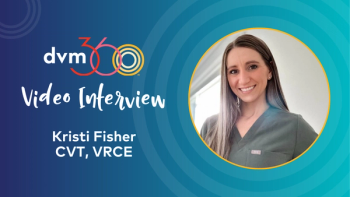
Rehab lessons from human medicine
I spent fifteen years as a veterinary technician before going back to school to become an occupational therapist. I thought there would be a major shift to human medicine, but I was wrong. Of course people aren't dogs or cats, but occupational therapy does so many of the same things that veterinary medicine does. We adapt equipment, educate families on care plans, perform treatments and so on. Occupational therapy (OT) is known as the jack-of-all-trades in the human medical world. Technicians are the same in veterinary medicine. We rely on our teammates to complete our job and help our clients.
Maybe right now you are asking what occupational therapy is. In a few words, we help get human patients back up and as independent as possible after an injury or illness. Sound familiar?
Why OTs are like technicians
OT means I spend my days doing tasks like these:
> Assisting with range of motion-as you might after orthopedic surgeries
> Promoting bed mobility-“flipping” patients who can't get up to prevent bed sores
> Helping patients get steady on their feet and able to walk again-believe it or not, that's not just a physical therapy thing
> Wrapping bandages, moving lines and tubes around when they are sick and many other things.
Not so different, eh? We all work with families of patients to help them help the patients when they're injured or sick.
I work with everyone from neonatal preemies to geriatric clients with dementia. When things aren't working as they should and I need to adapt things to make people able to do what they used to do, a lot of times I improvise and just make something.
When I was in veterinary medicine I was constantly making things up on the fly because I had to. You know not everything used in veterinary medicine was made for animals. A lot is human stuff that gets adapted for critters. You would think that wouldn't happen in human medicine, but it does-all of the time. A lot of times clients can't afford premade specialized equipment, so I make it. I build up handles on forks and spoons by using foam meant to insulate pipes. It gives an arthritic hand something larger and softer to hold onto. Yes, they sell them already made out of metal, but they're expensive and insurance doesn't cover it. I make do. I pad things, add rope to things and use equipment in ways the company never imagined.
Teamwork counts
In OT, I rely on physical therapist, speech therapists and social workers, just to name a few. The veterinary world uses receptionists, veterinary assistants, technicians, doctors and so on. Team playing means stronger successes for our patients. Some of the most important people to me when I worked in the veterinary world were the kennel workers. They made it possible for me to do my job without having to worry about the cleanliness of the kennel or whether the animals had been out to go to the bathroom or had clean cages. In human medicine we get pulled out into specialties a lot more, but we still function as a team. When I want to know if someone's eating, I talk to the certified nursing assistants.
Another big task we share is charting. “If you don't document it, you didn't do it” is our motto. Sound familiar? Maintaining charts is a huge part of helping that patient get back up and out of the door successfully. It's how we, the team, communicate. It also serves as a legal document, and so correct abbreviations and word choices are important.
There's a strong connection between human and veterinary medicine. As veterinary medicine becomes more high-tech and more insurance driven, the two worlds will blur even more. Still, at the end of the day, it's all about helping our patients, even if it's just looking into their eyes and letting them know we care. Or maybe it's about helping a family say goodbye or rejoicing in a recovery. Mostly though, it's about being behind the scenes and being needed. Thanks for making a difference in the lives of so many.
Caitlin Rivers is an occupational therapist and a former Firstline Editorial Advisory Board member who worked in the veterinary industry for more than 15 years.
Newsletter
From exam room tips to practice management insights, get trusted veterinary news delivered straight to your inbox—subscribe to dvm360.






